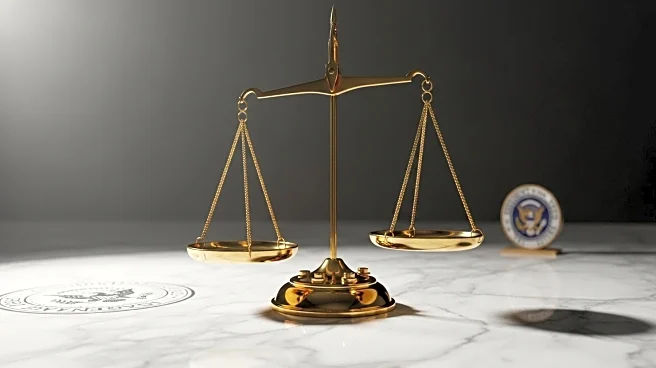What's Happening?
Federal Reserve officials are meeting this week to decide whether to lower interest rates, facing the complex task of addressing rising inflation and a slowing job market. This comes amid President Trump's unprecedented efforts to influence the central bank's decisions, including attempts to fire Fed Governor Lisa Cook and nominate Stephen Miran to the board. Trump's actions have infused chaos into the federal government, challenging the Fed's independence. Senate Republicans are rushing to confirm Miran, who has pledged to act independently despite concerns he may follow Trump's directives. The Fed is expected to announce a modest interest rate cut, balancing the threat of inflation with the need to stimulate economic growth.
Why It's Important?
The situation is critical for the U.S. economy, as Trump's tariffs have reignited inflation and his trade policies have slowed economic growth. The Fed's dual mandate to stabilize prices and maximize employment is at odds, creating a dilemma in these circumstances. Political interference in the Fed's decisions could lead to high inflation, reminiscent of the 1970s stagflation. The Fed's independence is crucial for long-term economic stability, and Trump's actions threaten this balance. The outcome of the Fed's meeting will have significant implications for economic policy and the future of U.S. economic growth.
What's Next?
Fed officials are expected to announce a modest interest rate cut, but the decision is fraught with political pressure. The confirmation of Stephen Miran could further complicate the Fed's independence, as Democrats raise alarms about Trump's influence. The Fed's ability to navigate these challenges will be crucial in maintaining economic stability. The situation is a 'once in a century event,' with severe consequences for wrong moves, particularly in the long run.
Beyond the Headlines
The interference by President Trump in the Fed's operations raises ethical concerns about the separation of powers and the independence of financial institutions. The long-term implications could include a shift in how future administrations interact with the Fed, potentially undermining its role in safeguarding economic stability. The historical precedent of political pressure leading to economic disruption highlights the importance of maintaining the Fed's autonomy.









